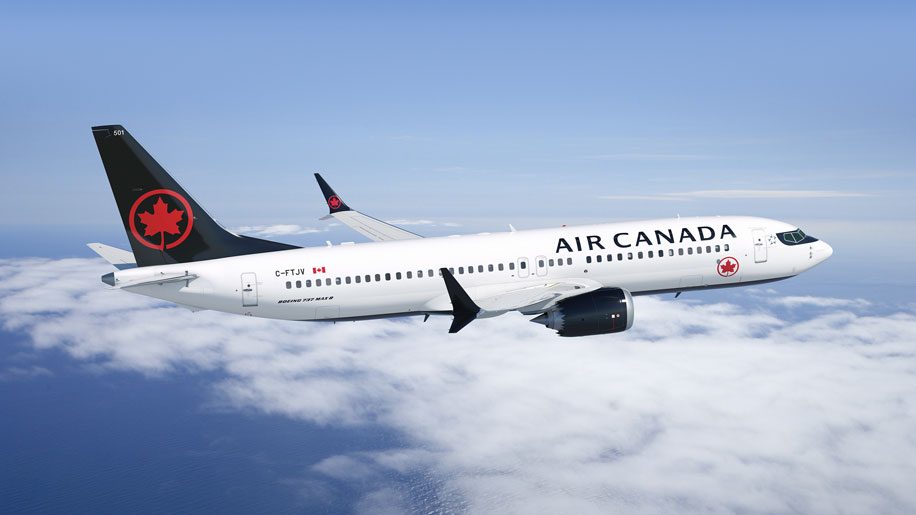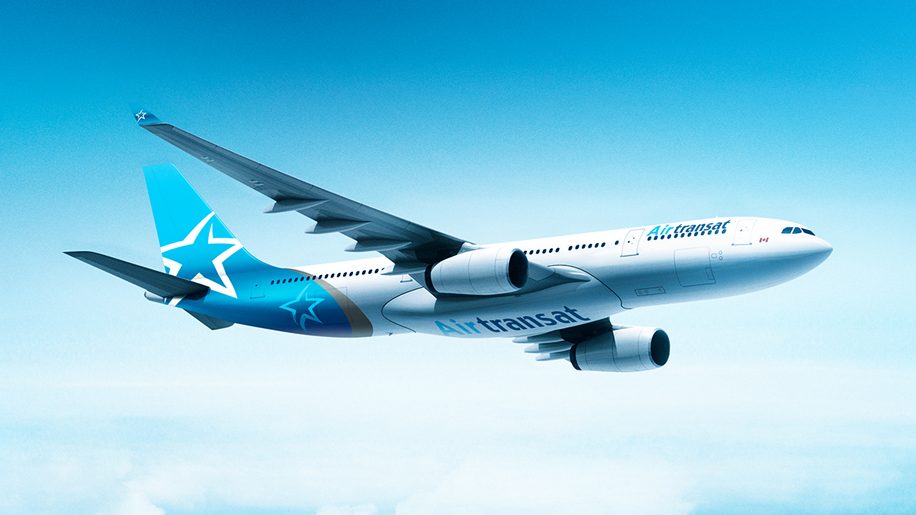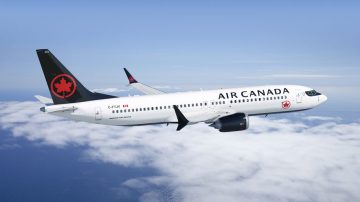
In many regards, Air Canada is flying high.
Shares in the 87-year-old flag carrier hit a record peak after it published its first-quarter results on May 6, defying expectations to show a year-on-year profit increase.
And while the growth it has seen over the last decade – largely fuelled by international expansion – is slowing, its $2.8 billion in pre-tax profit for 2018 was also its best-ever annual result. It is poised to acquire its low-cost, leisure-focused rival Air Transat, and is preparing to launch a new reservation system and loyalty programme next year. Recent investments include a revamp of its Signature Class business service across its wide-body fleet and a Signature lounge in Toronto focusing on high-quality dining that will soon come to Vancouver.
But there have been headwinds, too. The airline is one of the biggest customers for Boeing’s troubled B737-Max, forcing it to suspend routes as well as its financial guidance for the year. Meanwhile competition on transatlantic routes remains fierce, and the launch of Air Canada’s joint venture with Air China on January 1 coincided with one of the rockiest-ever periods in their countries’ relations.
Despite recent healthy results, the B737-Max groundings have “definitely had a financial impact,” said John MacLeod, Air Canada’s Vice President of Global Sales and Alliances, at the airline’s London office this week. Keeping that impact to a minimum has required a complicated balancing act.

“In the second quarter we’ve been able to operate 98 per cent of planned capacity. It won’t be as high in the third quarter because it is our peak, so assets are utilised at a much higher rate. August is uncertain because we don’t know if the Max will be able to fly.”
The carrier has 24 Max 8s in its fleet, while another 12 were expected to be delivered between the aircraft’s grounding in March and the busy summer season.
Air Canada has wet-leased wide-body aircraft from other airlines and put its own wide-body aircraft on domestic and Canada-US routes in order to replace the number of seats, though with reduced frequency. Qatar, Lufthansa and Omni Air will operate various routes on its behalf this summer.
It is also rolling out six A321s it purchased from now-defunct Wow, which it will reconfigure once the Max aircraft return, has entered its new A330s into service earlier than planned, and extended the leases on some of its A320s.
There have nonetheless been network changes, with Halifax and St John’s to Heathrow both suspended until July 31.
Air Canada is “still confident in the aircraft,” according to MacLeod, though he did not comment on whether the airline is expecting compensation from Boeing.
“We are talking to our flight ops, safety and maintenance teams, we are talking to Boeing almost every day, senior leaders are taking trips to Seattle, and we’re confident that the necessary fixes will be put in place for the aircraft to operate successfully.
“Up to now we’ve been one of the world’s bigger operators of this fleet type and had very successful operations with it, and we have every confidence it will be fixed. But we will be very careful about putting it back into service and make sure the authorities have approved it, while we do our own level of training and safety checks.”

A big change that could be ahead for the company is a possible takeover of Transat AT, parent company of its Montreal-based competitor Air Transat. Air Canada has entered into an exclusive agreement to purchase all issues and outstanding shares in the low-cost carrier, though the deal is still subject to due diligence proceedings and regulatory approval.
“Transat is a very good fit with us,” MacLeod commented.
“We’ve won the Skytrax Best Airline in North America and Transat has won Best Leisure Airline – so in a relatively small market like Canada, we can address all travel segments.
“They are also not just an airline but a leisure travel company – they own properties, sell more packages and have distribution channels to sell them. And they are particularly strong in Quebec, so it will strengthen our position there as a full-service, all-segment travel provider.”
Air Canada has its own low-cost subsidiary, Air Canada Rouge, which operates some of the same routes. MacLeod said decisions had not yet been made on how Transat would be managed – for example, whether it would retain its identity or be folded into Rouge.

Asked whether the acquisition would reduce competition in the market, as some commentators have suggested, MacLeod said: “If you look at competition on the Atlantic … we’re not just competing for Canada, we’re competing for America. Combining two airlines doesn’t make a big difference in the competitive environment.
“People really ask more about the northern winter competition – we will be much stronger in that market, but we still have competition from Westjet, as well as a company called Sunwing that operates mostly in the northern winter to sun destinations. Most of its aircraft come out of Europe and that capacity will have to compete.
“Competition is alive and well, and I think what we see is we will be able to offer more diversity and more options for travel, and compete more vigorously with those airlines than Air Canada can by itself today.”

What’s most exciting for MacLeod right now, he says, is an upcoming overhaul of Air Canada’s reservation system and loyalty programme.
The latter had been expected for some time, since the airline sold its current frequent flyer scheme, Aeroplan, to a marketing and loyalty analytics company called Aimia around a decade ago.
In January it announced that it had bought Aimia, after which it promised that customers’ existing status, miles and credit card programmes would not be affected.
However it will still relaunch the scheme, with MacLeod calling it a “unique ability to build something new.”
“We all know the mistakes and the hurdles for customers, so we’ve talked to 30,000 people about what a better programme would look like, what are the friction points,” he said.
Details will be announced towards the end of this year, and the programme will launch in the middle of 2020.
Concurrently, the airline has turned to Spain’s Amadeus to build its new computer and reservation system, which MacLeod says will provide another big change for customers.
“We’re excited. It’s a leap forward for us, and it’s going to enable much better customer service. Many of us wish we had done it ten years ago, but it’s a big project,” he said.
The Amadeus system is used by 20 other members of the Star Alliance network, so it should allow for better exchanges of information, and future projects across airlines. As head of alliances, this is something MacLeod wants to see, particularly in areas such as biometrics, bag tracking and seat reservations where there is still “a lot of work to be done.”
He believes alliances remain important for airlines as a way to extend their networks and reward frequent flyers.
For Air Canada, they are also the foundation of the deeper relationships it has with its joint venture partners, particularly its transatlantic joint venture with the Lufthansa Group and United.
“We’ve spent a long time making sure the business arrangements we have are ‘metal neutral’ – we don’t mind who sells whose flights because we all share in the benefits when any partner sells another partner’s flights,” MacLeod explains.
On January 1, Air Canada became the first North American carrier to launch a joint venture with a Chinese carrier – Air China – looking to access destinations beyond Shanghai and Beijing, and offer those beyond Vancouver and Montreal.
But since December 2018, relations between the two countries have turned frosty, with Huawei’s Chief Financial Officer Meng Wanzhou arrested on a US warrant in Canada, and two Canadian citizens detained in China.
According to MacLeod, the incidents “absolutely” impacted the fledgling partnership.
“The demand for travel is down between Canada and China. It’s a little bit difficult to differentiate between trade-related discussions and the geo-political situation between Canada and China, but the demand is down on both sides of the ocean.
“There are fewer businesspeople from Canada going to China, fewer tourist groups, school groups and state-owned enterprise leaders coming to Canada.
“We haven’t reduced our frequencies, but we’ve reduced our capacity. We have the flexibility of smaller aircraft to offer fewer seats to accommodate demand.”
However, he’s not panicking just yet.
“There have been some teething pains in the first quarter, but you expect that,” he says.
“I’m personally confident it will all blow over and the demand will return, it just will take some time.”












